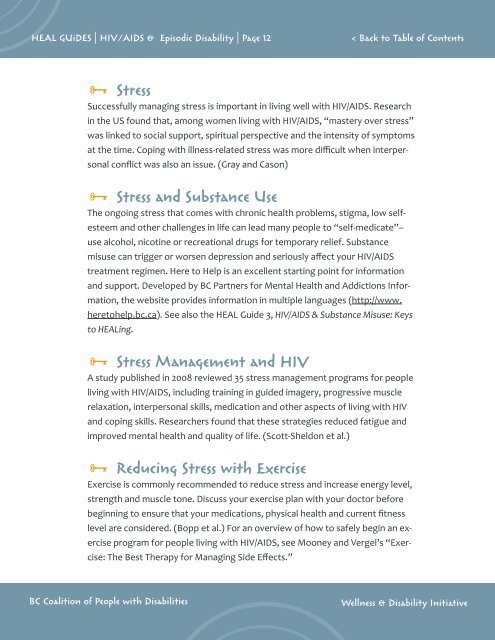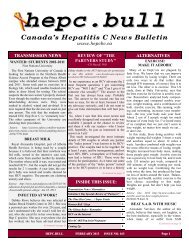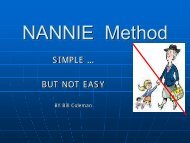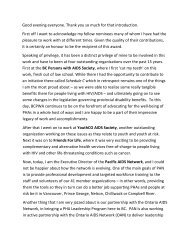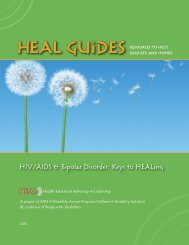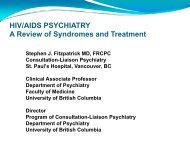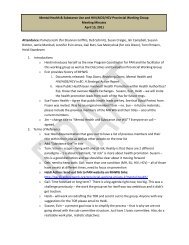HIV/AIDS & Episodic Disability: Keys to HEALing - bccpd
HIV/AIDS & Episodic Disability: Keys to HEALing - bccpd
HIV/AIDS & Episodic Disability: Keys to HEALing - bccpd
You also want an ePaper? Increase the reach of your titles
YUMPU automatically turns print PDFs into web optimized ePapers that Google loves.
HEAL Guides | <strong>HIV</strong>/<strong>AIDS</strong> & <strong>Episodic</strong> <strong>Disability</strong> | Page 12<br />
< Back <strong>to</strong> Table of Contents<br />
³³Stress<br />
Successfully managing stress is important in living well with <strong>HIV</strong>/<strong>AIDS</strong>. Research<br />
in the US found that, among women living with <strong>HIV</strong>/<strong>AIDS</strong>, “mastery over stress”<br />
was linked <strong>to</strong> social support, spiritual perspective and the intensity of symp<strong>to</strong>ms<br />
at the time. Coping with illness-related stress was more difficult when interpersonal<br />
conflict was also an issue. (Gray and Cason)<br />
³³Stress and Substance Use<br />
The ongoing stress that comes with chronic health problems, stigma, low selfesteem<br />
and other challenges in life can lead many people <strong>to</strong> “self-medicate”–<br />
use alcohol, nicotine or recreational drugs for temporary relief. Substance<br />
misuse can trigger or worsen depression and seriously affect your <strong>HIV</strong>/<strong>AIDS</strong><br />
treatment regimen. Here <strong>to</strong> Help is an excellent starting point for information<br />
and support. Developed by BC Partners for Mental Health and Addictions Information,<br />
the website provides information in multiple languages (http://www.<br />
here<strong>to</strong>help.bc.ca). See also the HEAL Guide 3, <strong>HIV</strong>/<strong>AIDS</strong> & Substance Misuse: <strong>Keys</strong><br />
<strong>to</strong> <strong>HEALing</strong>.<br />
³³Stress Management and <strong>HIV</strong><br />
A study published in 2008 reviewed 35 stress management programs for people<br />
living with <strong>HIV</strong>/<strong>AIDS</strong>, including training in guided imagery, progressive muscle<br />
relaxation, interpersonal skills, medication and other aspects of living with <strong>HIV</strong><br />
and coping skills. Researchers found that these strategies reduced fatigue and<br />
improved mental health and quality of life. (Scott-Sheldon et al.)<br />
³³Reducing Stress with Exercise<br />
Exercise is commonly recommended <strong>to</strong> reduce stress and increase energy level,<br />
strength and muscle <strong>to</strong>ne. Discuss your exercise plan with your doc<strong>to</strong>r before<br />
beginning <strong>to</strong> ensure that your medications, physical health and current fitness<br />
level are considered. (Bopp et al.) For an overview of how <strong>to</strong> safely begin an exercise<br />
program for people living with <strong>HIV</strong>/<strong>AIDS</strong>, see Mooney and Vergel’s “Exercise:<br />
The Best Therapy for Managing Side Effects.”<br />
BC Coalition of People with Disabilities<br />
Wellness & <strong>Disability</strong> Initiative


